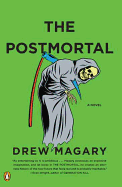
Right about now, according to the timeline of Drew Magary's debut novel, a genetic researcher in Oregon is trying to figure out a way to counteract the gene that produces red hair, and he's going to accidentally hit upon the key to halting the body's aging process permanently. (It's not immortality: you can still get sick, and you can still be killed.) As The Postmortal begins, it's the summer of 2019, and "the cure" is still illegal in the U.S., but readily available on the black market, and John Farrell, a 29-year-old attorney in Manhattan, is taking the plunge.
Magary has carefully thought through both the short-term and long-term consequences of functional eternal youth, and the world that's fleshed out in John's 60 years' worth of journal entries has many dark twists and flourishes, especially once the American president reluctantly lifts the ban. For every disturbed mother who wants her daughter to be eight months old forever, there's a "troll" who's ready to make the lives of the eternally young miserable. Russia loads up its army with postmortal soldiers and pushes its way into Eastern Europe and Canada, while China tries to preserve its dwindling resources by not just banning the cure, but branding every citizen with their birth date. John's crises may be on a smaller scale, but their power comes from their intimacy: his best friend and roommate is killed when a doctor's office is bombed by pro-death terrorists; he's not sure he has what it takes to get married when "forever" becomes a lot longer than it ever was. "Every morning I look in the mirror and see a body that's a lie," he says decades into the story. "I feel like this skin of mine is just a shell.... You could peel it away and all you'd see underneath would be a sick, wrinkled old man."
John's journal entries are the core of the novel, but Magary really sells his dystopian future with the other "documents" sprinkled throughout the story--pitch-perfect parodies of newspaper and TV articles, religious brochures, even medical bulletins. (As the world's population grows out of control, pharmaceutical companies develop a drug to treat "overcrowding anxiety disorder.") He understands that satire is most effective when it gives the real world a gently absurd nudge, then lets its characters react much as we ourselves might under the same circumstances. --Ron Hogan, founder of Beatrice.com

